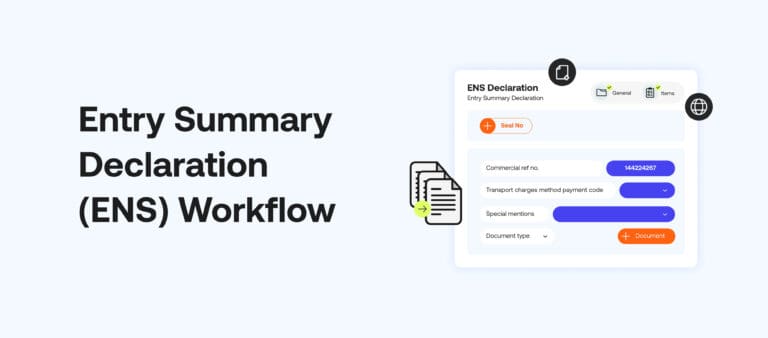Fast & Accurate ENS GB & EU ICS2 Solutions Built for You.
Customs Software Explained: All you need to know
-
Freya Jane
- Director of Customer's Success
In today’s digital age, keeping track of and discovering vital information in hundreds of documents can be difficult. “According to IDC’s prediction, the size of the global datasphere is expected to reach 163 zettabytes (one trillion gigabytes) by 2025. Manually processing the growing amount of invoices and other documents is not only costly and time-consuming but also error-prone.” This is where Intelligent Document Processing (IDP) enters, a game changer in handling documents, data extraction automation, and workflow optimisation.
Customs software, as the word indicates, is a software solution that encapsulates all essentials of import/export customs clearance, fast-paced document submissions, best AI, advanced machine learning, accurate data transfers and compliance with regulations. It allows you to handle bulk data to be resolved and registered in just a few seconds.
A report by the National Audit Office shows the need for CDS; it concludes,
“HMRC has developed a new customs system, which was part of HMRC’s previous programme. However, given the customs problems faced by UK imports and exports, it should have been done earlier.”
Welcome to the age of technology, where software solutions have gained heights and made our lives easier. Customs software is one such relief where trading on borders becomes convenient, the documentation web is simplified, and services are accurately authentic. The best part is that it is speedy & reliable.
CDS software streamlines the customs clearance process, ensuring ease of operation and accuracy.
First you need to know what Customs Software is!
About Customs Software: Quick-to-get Definition
“A software solution that aims to serve your border exchange better, make documentation process simpler, comply with regulations, make the clearance process feasible and make the classification of goods easier.”
iCustoms lets you manage customs globally at an efficient pace.
A Glance at the Shift from CHIEF to CDS
Brexit is the term used to describe the UK’s exit from the European Union (EU). It refers to the process by which the United Kingdom withdrew from the European Union, which affected different aspects of immigration, trade, legislation, and regulations.
HMRC is the customs authority of the UK, which has the mechanism of CHIEF (Customs Handling of Import and Export Freight). However, a shift has taken place where CDS (customs declaration software) has been introduced to work more efficiently than CHIEF.
Following Brexit, the transition from CHIEF to CDS acquired significance in streamlining customs processes in the United Kingdom. The term “shift from CHIEF to CDS” describes how the Customs Declaration Service (CDS) system took the place of the Customs Handling of Import and Export Freight (CHIEF) system in the United Kingdom. Customs declarations for imports and exports were handled by the outdated CHIEF system, whereas the more recent CDS digital platform was created to expedite and simplify customs procedures.
A number of factors led to the switch from CHIEF to CDS, including:
- Adherence to EU customs laws: CHIEF did not comply with the Union Customs Code (UCC), a collection of laws that regulates customs practises within the European Union. The purpose of CDS was to ensure that the UK’s customs system remained compliant with EU standards by adhering to the UCC.
- Efficiency and Modernization: CHIEF was an outdated system that was getting harder to update and maintain. CDS is a cloud-based platform with enhanced security, scalability, and functionality.
- Enhanced trade facilitation: By lowering expenses, delays, and administrative burdens, CDS is intended to enable more efficient and seamless customs procedures, which can be advantageous for businesses.
The switch to CDS has been implemented gradually, with varying deadlines for various kinds of declarations. March 30, 2024, is the final date by which all customs declarations must use CDS.
Have a look at the table below to know the main difference points of working between CHIEF and CDS. Also, understand what exactly the shift is!
Curious to learn more about the CHIEF to CDS shift? Read more!
Eight Signs of Best Customs Software
For easier understanding, let’s take a look from a different angle. Imagine yourself in a room containing files and records.
Assume that you are looking for a particular file now. The problem comes in when you need help finding where to look for it. All of a sudden, you come across someone who is carrying a fantastic gadget. This tool easily directs you to the precise area that has your file. It is within your reach in a matter of moments.
Let’s now leave this hypothetical situation behind and make some comparisons to custom software solutions. Your vast amount of data, border needs, legal frameworks, and products are mirrored in the room that is packed with paperwork.
The file you are looking for is similar to your completed data and the quick clearance of imports and exports. Additionally, the customs software takes on the role of the person using the device, enabling quick submissions and clearances in a matter of seconds.
As a result, the fastest and most effective customs software guarantees the accuracy of submissions.
Have a look at the eight indications of the best customs software:
1. Optimised Processes Through the Best AI & ML
Firstly, customs brokerage software that utilises machine learning and AI can help Customs and Border Protection to more efficiently and accurately process the increasing volume of trade and travel.
In addition, these technologies can help to improve data collection and analysis, as well as target potential threats. Therefore, the best customs software will have efficient AI and advanced machine learning, which will make things go smoothly line!
2. Scalability is an Imperative Indication
Secondly, customs compliance software should be able to move goods across borders by streamlining the process and making it more efficient.
However, with the ever-changing landscape of global trade, it’s important to have a solution that is scalable. So, customs software that can’t keep up with the demands of your business will only make you skate in thunder waves.
3. It is Capable of Handling Bulk Data
Next, good Customs duty management software helps businesses manage their customs processes with the ease of an eye blink. Also, it can be used to track shipments, submit declarations, and pay duties and taxes.
Moreover, customs management software helps businesses save time and money by reducing the need for manual data entry and increasing accuracy. Hence, it is able to handle bulk data in minutes, and that’s the main indication of why it is needed by future trade systems.
4. Accuracy & Transparency is the Critical Component
Also, it is important that the software is accurate and transparent. Also, there are many different types of customs duty software available, and each has its own strengths and weaknesses. Therefore, it is important to choose the right software for your needs.
Learn more with this detailed CDS FAQ guide
5. Cost Efficiency is What Businesses Strive For!
A key component of good customs software should be cost-effectiveness. It goes without saying that for a business owner, quality and pricing are top priorities. Therefore, the best customs software guarantees both cost-effectiveness and expedited services, achieving a balance between speed and quality.
Plus, the best custom software is more than just reasonably priced. It incorporates several features that improve operational simplicity while maintaining a high level of service. This all-inclusive strategy guarantees that your company will save money without sacrificing the effectiveness and calibre of customs procedures.
6. The Essential Need for Authenticity
A crucial decision for companies involved in global trade is choosing the right customs administration software. This programme must accurately calculate duties and taxes in addition to maintaining current compliance with the constantly changing regulatory environment. For efficient and legal international trade activities, it is essential to maintain current regulatory knowledge and guarantee precise computations.
7. Compliance Assurance
Due to strict regulatory systems, making sure that rules are followed is very important in international trade. Custom declaration software makes this process simpler, which centralises and automates essential processes. It simplifies the correct filing of customs declarations and guarantees compliance with import and export laws. By verifying entries, cross-referencing data, and keeping up with changing requirements, this software makes compliance easy. Consequently, it reduces errors, speeds up clearance, and guarantees that companies adhere to regulatory requirements without adding the needless complexity that comes with conventional manual processes.
8. Submission Speed Matters a Lot!
Lastly, customs filing software is designed to help businesses automate the process of Customs declarations and other documentation. Additionally, this can help to speed up the submission process, as well as reduce the chance of errors.
Hence, good customs import software makes your imports convenient. It is a customs export software which provides a handful of solutions.
Want to learn how you can manage Customs Effortlessly? Start Now!
Problems Users Face Regarding Customs Clearance
Customs clearance can be a time-consuming and complicated process, especially if you’re not familiar with the procedures.
It involves a lot of paperwork and documentation, and it can be easy to make a mistake that may delay your shipment or even result in rejection.
Let’s have a look at these problems:

Solution at Hand Via Customs Clearance Software
There are many reasons to use customs declaration services available to help with customs clearance problems. These solutions can help to automate the customs process and make it more efficient.
CDS software has eradicated the amount of paperwork that was needed for customs clearance. It provides custom support and can also help to track shipments and make sure that they are compliant with customs regulations. Furthermore, it can help to provide visibility into the customs process so that you can see where your shipment is at all times.
It is capable of speeding up the customs clearance process so that you can get your shipment through customs more quickly. Customs software providers make the acquisition of clearance services at the ease of your fingertips.
It doesn’t only resolve the clearance juggles, but also ensures the classification of goods, technical support, and ease of customs procedures!
Defining basic terms

Conclusion
Customs software is a useful tool for efficiently managing the customs clearance procedure, making it easy to handle the challenges of international trade. It might be difficult to navigate exports and imports through the intricate web of international trade, but with iCustoms, it becomes a simple task.
We provide a complete, one-stop solution that is designed to satisfy all of your customs requirements. Our platform’s architecture aims to simplify and expedite these complex procedures, guaranteeing a more seamless and effective trading experience.
Click now to maximise your international trade experience with iCustoms, the greatest customs software platform at your fingertips.
As it is rightly said:
“Future holds revolutionary advancements, and these advancements hold the reins of businesses. Trade all over the world will be just one click away.”
FAQ's
What is CDS (Custom Declaration Service)?
The UK's new customs declaration system, known as CDS (Customs Declaration Service), replaced earlier ones to allow for quicker and more effective customs processing.
What Products Must I Declare During Customs Clearance United Kingdom?
All items coming into or going out of the UK have to be declared, together with their kind, value, and quantity.
How Does CDS Streamline the Customs Declaration Process?
In order to streamline the declaration process and enable quicker and more accurate submissions, CDS automates and centralises customs procedures.
Where Can I Find Guidance on What to Declare at UK Customs?
The UK government offers detailed rules that classify commodities for ease of reference and specify which things must be declared at customs.
You may also like:
Ready to streamline your Customs Declaration Process?
Boost efficiency, reduce errors, and ensure accuracy with iCDS
Subscribe to our Newsletter
About iCustoms
Ready to streamline your Customs Declaration Process?
Boost efficiency, reduce errors, and ensure accuracy with iCDS


